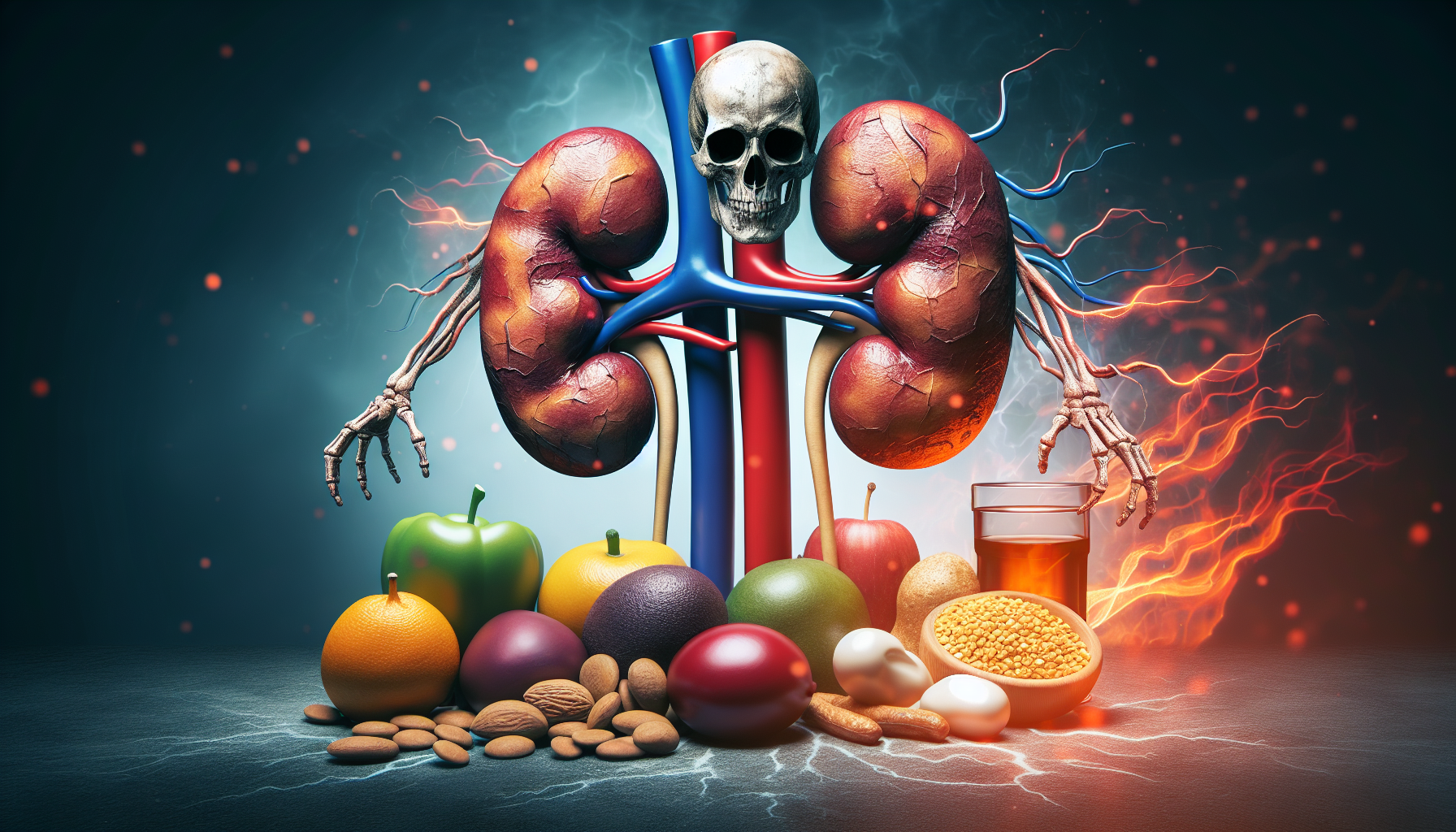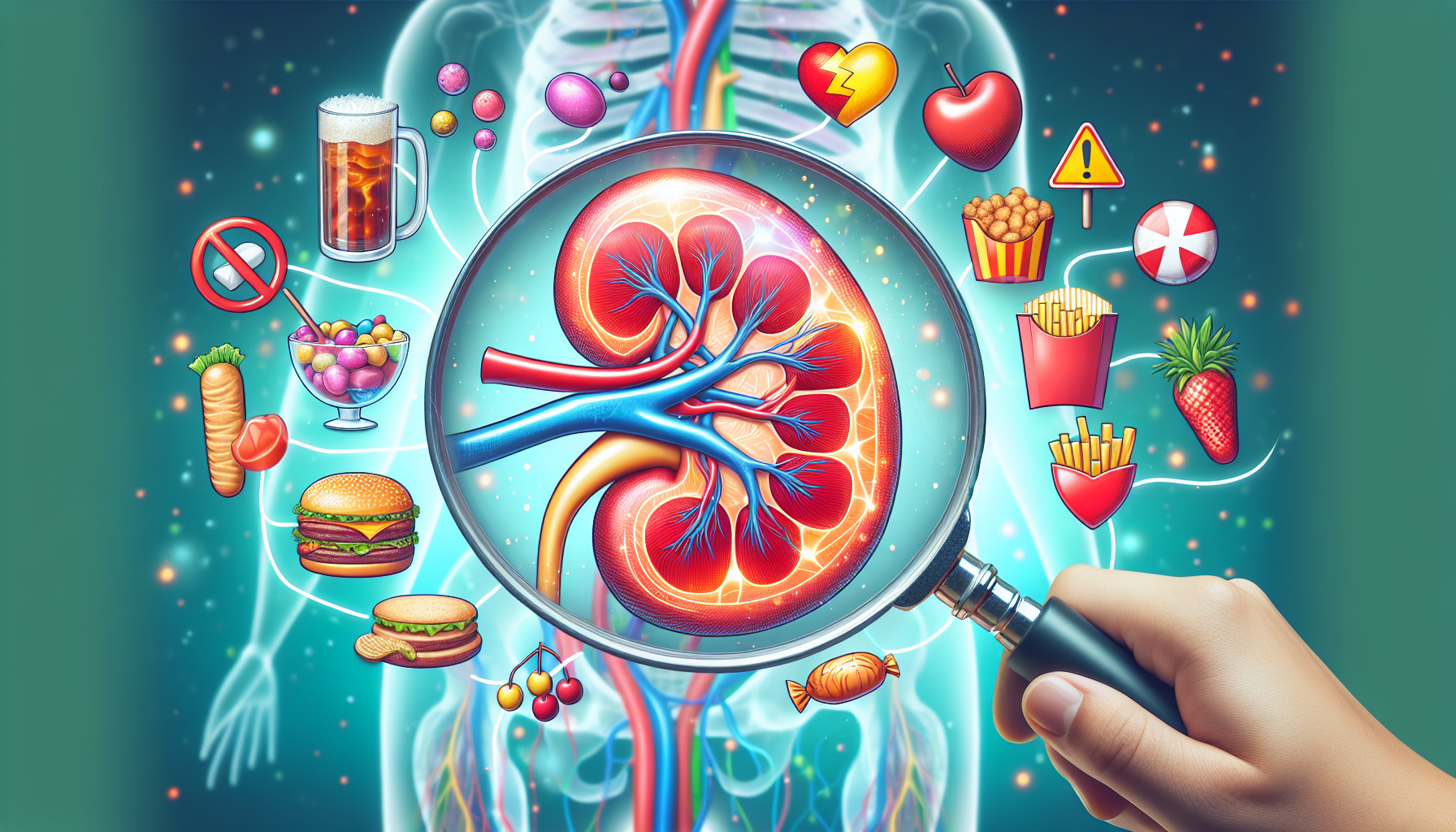Have you ever wondered if poor nutrition can lead to chronic kidney disease? Recent scientific studies have shed light on this subject, providing valuable insights into the potential link between inadequate dietary choices and the development of this debilitating condition. One study conducted by researchers at Johns Hopkins University found that individuals with a high intake of processed foods, red meat, and beverages sweetened with sugar were at a higher risk of developing chronic kidney disease. Another study published in the Journal of the American Society of Nephrology reported that a diet rich in fruits, vegetables, whole grains, and low-fat dairy products was associated with a lower risk of kidney function decline. These studies highlight the significant impact that our food choices can have on our long-term kidney health. So, ensure you prioritize a balanced and nutritious diet to safeguard your kidney health and overall well-being.
Discover the Ultimate Weight Loss Secrets Here!
Overview of Chronic Kidney Disease (CKD)
Chronic Kidney Disease (CKD) is a condition characterized by the gradual loss of kidney function over time. It is a long-term, progressive condition that can have a significant impact on your overall health and well-being. CKD is typically classified into five stages, with Stage 1 being the mildest and Stage 5 being the most severe, often requiring dialysis or kidney transplant.
Definition of Chronic Kidney Disease
CKD is defined as a condition in which your kidneys are unable to effectively filter waste and excess fluids from your blood. This results in a buildup of toxins and waste products in your body, which can lead to various complications. Common symptoms of CKD include fatigue, swelling, changes in urination pattern, and loss of appetite.
Prevalence and Impact of CKD
CKD is a prevalent condition worldwide, affecting millions of people. According to the National Kidney Foundation, an estimated 37 million adults in the United States have CKD, with millions more at risk. The impact of CKD extends beyond kidney health, as it is associated with an increased risk of cardiovascular disease, anemia, bone disorders, and even premature death.
Causes and Risk Factors of CKD
There are numerous causes and risk factors that contribute to the development and progression of CKD. Diabetes and high blood pressure are the leading causes of CKD, accounting for the majority of cases. Other risk factors include obesity, smoking, age, family history of kidney disease, and certain ethnicities, such as African Americans, Hispanic Americans, and Native Americans.
Understanding Poor Nutrition
Good nutrition plays a vital role in maintaining overall health and preventing various diseases, including CKD. Poor nutrition, on the other hand, refers to a diet that lacks essential nutrients and is high in unhealthy substances. It can have detrimental effects on your body’s functioning and increase the risk of developing chronic diseases like CKD.
Definition of Poor Nutrition
Poor nutrition refers to an inadequate intake of essential nutrients, vitamins, and minerals necessary for optimal health. It can result from a diet high in processed foods, added sugars, unhealthy fats, and low in fruits, vegetables, whole grains, and lean proteins. Poor nutrition can also be caused by factors such as food insecurity, limited access to nutritious foods, and a lack of nutrition education.
Types of Poor Nutrition
There are various types of poor nutrition, including malnutrition, overnutrition, and imbalanced nutrition. Malnutrition occurs when you consistently do not consume enough nutrients to meet your body’s needs, resulting in weight loss, fatigue, and weakened immune function. Overnutrition, on the other hand, refers to excessive calorie intake, leading to overweight or obesity, and an increased risk of chronic diseases. Imbalanced nutrition refers to a diet with an improper ratio of macronutrients or an inadequate intake of specific nutrients.
Consequences of Poor Nutrition
Poor nutrition can have severe consequences for your overall health and well-being. It can weaken your immune system, making you more susceptible to infections and illnesses. It can also lead to deficiencies in essential vitamins and minerals, which can contribute to impaired organ function and hinder various bodily processes. Additionally, poor nutrition is associated with an increased risk of chronic diseases such as heart disease, diabetes, and CKD.
Click Here for Proven Fat-Burning Strategies!
Link Between Poor Nutrition and Chronic Kidney Disease
Recent scientific studies have shed light on the link between poor nutrition and the development and progression of CKD. These studies have explored the impact of dietary patterns, nutrient intake, and overall nutritional status on CKD risk, progression, and mortality.
Review of Relevant Studies
One study published in the Journal of the American Society of Nephrology examined the association between dietary patterns and CKD risk among a large group of adults. The study found that individuals who followed a Western diet, characterized by high intake of processed foods, red meat, and sugary drinks, had a significantly higher risk of developing CKD compared to those following a healthier diet rich in fruits, vegetables, whole grains, and lean proteins.
Another study published in the American Journal of Kidney Diseases investigated the role of nutrient intake in CKD progression. The researchers found that a higher intake of certain nutrients, such as protein, sodium, and phosphorus, was associated with an increased risk of CKD progression. Conversely, a lower intake of these nutrients, along with adequate fluid intake, was associated with a slower decline in kidney function.
A third study conducted in Taiwan and published in the Clinical Journal of the American Society of Nephrology examined the association between poor nutrition and CKD mortality. The study found that individuals with poor nutritional status, as assessed by low protein and energy intake, had a higher risk of mortality among CKD patients. These findings highlight the importance of addressing nutritional factors in the management of CKD.
Nutritional Risk Factors for Chronic Kidney Disease
Several nutritional factors contribute to the development and progression of CKD. It is important to be aware of these risk factors and make appropriate dietary modifications to reduce the burden on your kidneys.
High Sodium Intake
Excessive sodium intake can increase blood pressure and cause fluid retention, both of which put a strain on the kidneys. A diet high in processed and packaged foods, which are often loaded with sodium, can significantly increase the risk of CKD and worsen its progression. Limiting sodium intake and opting for fresh, unprocessed foods can help protect your kidney health.
Excessive Protein Consumption
Consuming an excessive amount of protein, especially from animal sources, can increase the workload on your kidneys. When your body metabolizes protein, it produces waste products, such as urea, that need to be filtered out by the kidneys. A high protein intake puts additional strain on the kidneys, potentially accelerating kidney damage. It is recommended to moderate protein intake and choose lean sources, such as poultry, fish, and legumes.
Inadequate Fluid Intake
Dehydration can have a negative impact on kidney health. Inadequate fluid intake can lead to concentrated urine and an increased risk of kidney stone formation. Additionally, dehydration can impair kidney function, making it harder for the kidneys to remove waste products and maintain fluid balance. It is important to drink an adequate amount of water throughout the day to support kidney function.
High Phosphorus and Potassium Levels
Elevated levels of phosphorus and potassium in the blood can be detrimental to kidney health. Phosphorus-rich foods, such as processed meats, carbonated drinks, and certain dairy products, should be consumed in moderation as excess phosphorus can lead to mineral imbalances and bone disorders. Similarly, high potassium intake, often found in bananas, avocados, and potatoes, can be problematic for individuals with compromised kidney function. Monitoring and controlling phosphorus and potassium levels through diet is crucial for managing CKD.

Unlock Your Path to a Healthier You!
Effects of Poor Nutrition on Kidney Health
Poor nutrition can directly impact kidney health through various mechanisms, contributing to the development and progression of CKD.
Impaired Glomerular Filtration Rate
A nutritionally unbalanced diet can lead to impaired glomerular filtration rate (GFR), which represents the kidney’s ability to filter waste products from the blood. When the GFR decreases, the kidneys become less efficient in removing toxins and waste, leading to their accumulation in the body. This can further damage the kidneys and worsen CKD progression.
Kidney Inflammation and Oxidative Stress
Poor nutrition can cause inflammation and oxidative stress, both of which can damage the kidneys. An unhealthy diet high in processed foods, saturated fats, and added sugars can promote inflammation in the body, including the kidneys. Similarly, inadequate intake of antioxidants and other beneficial compounds found in fruits, vegetables, and whole grains can contribute to oxidative stress, impairing kidney function.
Alterations in Blood Pressure and Fluid Balance
Poor nutrition, particularly excessive sodium intake, can lead to high blood pressure and fluid retention. Increased blood pressure can damage the blood vessels in the kidneys, reducing their efficiency in filtering waste. Fluid retention, on the other hand, puts additional strain on the kidneys, potentially causing further kidney damage. Maintaining a balanced diet and fluid intake is crucial for regulating blood pressure and fluid balance, promoting kidney health.
Interaction of Poor Nutrition with Chronic Medical Conditions
Poor nutrition not only affects kidney health but can also interact with other chronic medical conditions, exacerbating their effects and increasing the risk of complications.
Diabetes and Poor Nutrition
Poor nutrition plays a significant role in the development and management of diabetes, a leading cause of CKD. Unhealthy dietary habits, such as excessive consumption of sugary beverages, processed foods, and high-fat meals, can contribute to the development of type 2 diabetes. In individuals with diabetes, poor nutrition can further worsen blood sugar control, leading to complications such as kidney damage and cardiovascular disease.
Obesity and Poor Nutrition
Obesity is closely linked to poor nutrition and is a major risk factor for CKD. An unhealthy diet high in calorie-dense foods and low in nutrients can contribute to weight gain and the development of obesity. Excess body weight puts a strain on the kidneys, increasing the risk of developing CKD. Poor nutrition can also make it challenging to lose weight and maintain a healthy body weight, further increasing the risk of kidney disease.
Cardiovascular Disease and Poor Nutrition
Poor nutrition is a significant contributor to the development and progression of cardiovascular disease (CVD), which is closely associated with CKD. Unhealthy dietary habits, such as a high intake of saturated and trans fats, added sugars, and excessive sodium, can raise blood cholesterol levels, increase blood pressure, and promote inflammation, all of which are risk factors for CVD. Individuals with CKD are already at an increased risk of developing CVD, making it crucial to prioritize a heart-healthy diet.
Role of Nutritional Interventions in CKD Management
Dietary modifications play a crucial role in the management of CKD, helping to slow down the progression of the disease, prevent complications, and improve overall well-being.
Importance of Dietary Modifications
Dietary modifications are essential to support kidney health and manage CKD. Depending on the stage of CKD and individual needs, adjustments to macronutrient intake, meal planning, and portion control may be necessary. Proper nutrition can help ensure adequate energy and nutrient intake, promote weight management, control blood pressure, manage blood sugar levels, and reduce the burden on the kidneys.
Restriction of Sodium and Fluid Intake
Controlling sodium and fluid intake is critical for individuals with CKD. Restricting sodium helps manage blood pressure and fluid balance, reducing strain on the kidneys. Limiting fluid intake helps prevent fluid overload and assists the kidneys in maintaining proper fluid balance. It is important to work with a registered dietitian to determine the appropriate limits for sodium and fluid intake based on individual needs.
Optimal Protein Consumption for CKD Patients
Protein intake needs to be carefully regulated for individuals with CKD. While protein is essential for overall health, excessive protein intake can contribute to kidney damage. Moderating protein consumption and choosing high-quality sources, such as lean meats, poultry, fish, and plant-based proteins, can help meet nutritional needs while minimizing the strain on the kidneys. A registered dietitian can provide personalized recommendations based on individual kidney function and nutritional requirements.
Monitoring and Controlling Phosphorus and Potassium
Phosphorus and potassium levels need to be closely monitored in individuals with CKD. Elevated levels of these minerals can have adverse effects on kidney health. Limiting the consumption of phosphorus-rich foods, such as processed meats, carbonated drinks, and certain dairy products, can help control phosphorus levels. Monitoring and controlling potassium intake by choosing low-potassium alternatives and avoiding high-potassium foods, such as bananas and tomatoes, can also help maintain optimal levels.
The Impact of Socioeconomic Factors on Nutrition and CKD
Socioeconomic factors play a significant role in shaping dietary habits and nutritional status, which, in turn, can influence the risk and management of CKD.
Food Insecurity and Malnutrition
Food insecurity, defined as limited or uncertain access to nutritionally adequate and safe foods, is a significant socioeconomic factor that can lead to poor nutrition and malnutrition. Individuals experiencing food insecurity may have limited resources to purchase a variety of nutrient-rich foods, resulting in imbalanced diets and nutrient deficiencies. This can increase the risk of chronic diseases, including CKD.
Limited Access to Nutritious Foods
Limited access to nutritious foods, often referred to as food deserts, is another socioeconomic factor that can contribute to poor nutrition and increased CKD risk. In some communities, particularly low-income areas, there may be a lack of grocery stores or fresh food options. This can make it challenging for individuals to obtain a diverse range of fruits, vegetables, whole grains, and other nutrient-rich foods, leading to suboptimal dietary patterns.
Educational Disparities in Nutrition Knowledge
Educational disparities in nutrition knowledge and awareness can influence dietary choices and nutrient intake, potentially affecting kidney health. Individuals with limited education may have less access to evidence-based nutrition information, making it harder for them to make informed choices about their dietary habits. This can result in poor nutrition and a higher risk of developing CKD.

Prevention Strategies to Minimize CKD Risk
Preventing CKD and its complications starts with adopting healthy lifestyle habits and implementing strategies to ensure adequate nutrition and overall well-being.
Promoting Healthy Lifestyle Habits
Adopting healthy lifestyle habits is essential for minimizing the risk of developing CKD. This includes maintaining a balanced diet, engaging in regular physical activity, managing stress, getting enough sleep, and avoiding tobacco and excessive alcohol consumption. By taking care of your overall health, you can reduce the burden on your kidneys and promote optimal kidney function.
Nutrition Education and Awareness
Promoting nutrition education and awareness is crucial for preventing CKD and ensuring optimal dietary choices. By providing accessible and evidence-based nutrition information, individuals can make informed decisions about their diet and take proactive steps towards kidney health. Educational programs, community initiatives, and targeted interventions can help raise awareness about the importance of good nutrition and its impact on kidney health.
Improving Socioeconomic Conditions
Addressing socioeconomic factors, such as food insecurity and limited access to nutritious foods, is fundamental in preventing CKD. By improving socioeconomic conditions, ensuring equal access to affordable and nutrient-rich foods, and addressing educational disparities, the risk of poor nutrition and CKD can be reduced. Implementation of social policies and community-based programs can contribute to a healthier and more equitable food environment.
Conclusion
The link between poor nutrition and chronic kidney disease is well-established through various studies and research. Poor nutrition, including inadequate nutrient intake, high sodium consumption, excessive protein intake, and imbalanced fluid levels, can significantly impact kidney health and contribute to the development and progression of CKD. Furthermore, poor nutrition can interact with other chronic medical conditions, such as diabetes, obesity, and cardiovascular disease, exacerbating their effects on kidney health. However, through appropriate dietary modifications, monitoring of key nutrients, and addressing socioeconomic factors, the risk of CKD can be minimized, and overall kidney health can be promoted. Prioritizing good nutrition and making healthy choices will not only benefit your kidneys but also your overall well-being.



